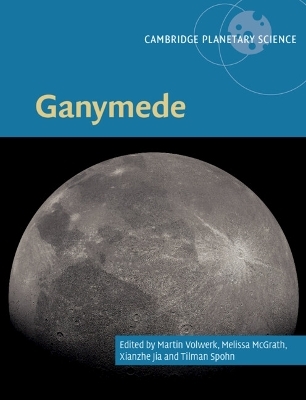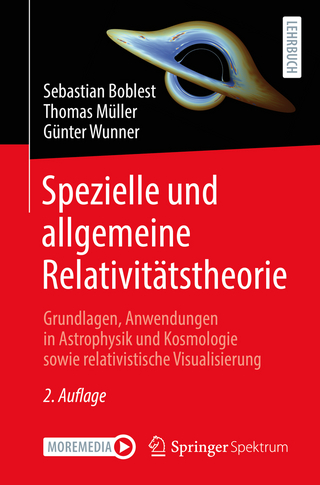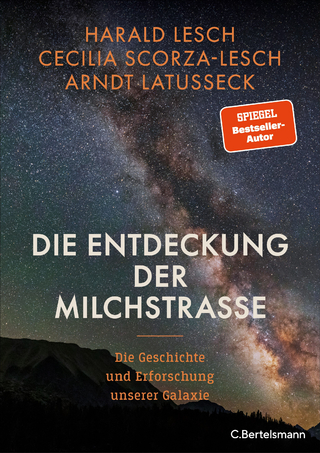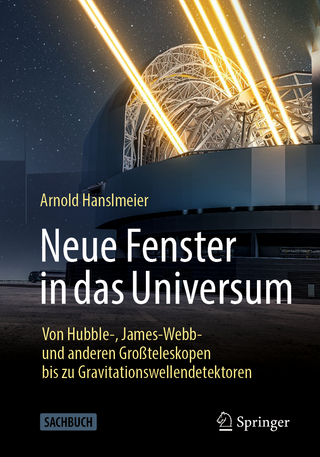
Ganymede
Cambridge University Press (Verlag)
978-1-108-83295-3 (ISBN)
- Noch nicht erschienen (ca. Januar 2025)
- Versandkostenfrei innerhalb Deutschlands
- Auch auf Rechnung
- Verfügbarkeit in der Filiale vor Ort prüfen
- Artikel merken
With ESA's upcoming JUpiter ICy moons Explorer (JUICE) mission to Jupiter and Ganymede, this book provides a fascinating and timely summary of our current knowledge about Ganymede: the largest moon in the Solar System and the only one with an intrinsic magnetic field. Written by a team of multidisciplinary experts spanning geology, space physics and habitability, it provides up-to-date knowledge about Ganymede. The history of its discovery, formation, surface, atmosphere and space environment are discussed in accessible language and supported by the enormous amount of data obtained by Galileo, the Hubble Space Telescope and earlier missions. The latest surface maps of Ganymede are also presented, providing an invaluable reference for graduate students and researchers working in planetary science.
Martin Volwerk is a permanent member of staff at the Space Research Institute of the Austrian Academy of Sciences, Co-Investigator on the JUICE magnetometer and those on other missions, and national Co-Principal Investigator on the Comet Interceptor mission. His thirty-year career as a planetary plasma physicist has focused on studying plasma interactions at the Galilean moons, ultra-low frequency waves in planetary magnetospheres, and cometary plasma physics. Melissa McGrath is a senior scientist at the Carl Sagan Science Center, SETI Institute. She has had a distinguished career with over thirty years of experience as a planetary scientist studying Jupiter's four large Galilean satellites: Io, Europa, Ganymede and Callisto. She has worked on numerous NASA missions, including the Hubble Space Telescope, and the upcoming JUICE and Europa Clipper missions, and she has held leadership positions at NASA, the International Astronomical Union, and the American Astronomical Society. She has also served as a scientific editor for The Astrophysical Journal. Xianzhe Jia is a Professor at the University of Michigan. He is a space physicist with expertise in combining computer simulations with spacecraft measurements to study magnetic fields and plasma phenomena in planetary environments. He is Co-Investigator on the JUICE and Europa Clipper missions currently under development for exploration of the Jupiter system. Tilman Spohn is a planetary scientist at the International Space Science Institute in Bern, Switzerland. His work focuses on modelling the interior structure and thermal evolution of planets and icy satellites, with a particular emphasis on their cores and magnetic field generation. He has led instrument teams on the NASA InSight mission to Mars and the ESA Rosetta mission to comet 67P/Churyumov-Gerasimenko. He is an American Geophysical Union Fellow and a recipient of the Runcorn-Florensky medal, awarded by the European Geosciences Union for exceptional contributions to planetology. He is also a member of the Academy of Astronautics and of Academia Europaea.
Part I: History, Origin, Dynamics: 1. Ganymede through the ages Martin Volwerk, Katrin Stephan, Roland Wagner and Apurva V. Oza; 2. Origin of Ganymede and the Galilean moons Yuhito Shibaike and Yann Alibert; 3. The rotation of Ganymede Alexander Stark, Rose-Marie Baland, Tim Van Hoolst, Nicolas Rambaux and Gregor Steinbrügge; 4. Tidal deformation and tidal evolution of Ganymede Gregor Steinbrügge, Hauke Hussmann, Gabriel Tobie, Julie Castillo-Rogez, Valéry Lainey and Alexander Stark; 5. Ganymede's statigraphy and geologic evolution Ralf Jaumann, Katrin Stephan, Roland Wagner, Hauke Hussmann, Pasquale Palumbo, Alice Lucchetti, Frank Postberg, Thomas Roatsch and Alexander Stark; Part II: Geology, Surface, Interior: 6. Internal structure of Ganymede Hauke Hussmann, Gerald Schubert, Gregor Steinbrügge, Frank Sohl and Jun Kimura; 7. Ganymede's geology Robert T. Pappalardo, Marissa E. Cameron, Geoffrey C. Collins, James W. Head, Paul Helfenstein, Samuel M. Howell, Alice Lucchetti, Thomas B. Mccord, Jeffrey M. Moore, Erica M. Nathan, Louise M. Prockter, Costanza Rossi, Paul M. Schenk and John R. Spencer; 8. The cratering record of Ganymede: surface ages, impactor populations, and evolutional history Michelle R. Kirchoff, Amy Barr, Michael Bland, Veronica Bray, Edgard G. Rivera-Valentín and Paul Schenk; 9. The topography of Ganymede: geology, global characteristics, and future exploration Paul Schenk, William Mckinnon, Jeffrey Moore and Francis Nimmo; 10. Ganymede's surface composition Katrin Stephan, Charles A. Hibbitts, Nicolas Ligier, Philippa M. Molyneux, Francois Poulet, Louise M. Prockter, Amanda R. Hendrix, Geoffrey C. Collins, Caitlin J. Ahrens and Ralf Jaumann; 11. Physical chemistry and thermal properties of ices at Ganymede Caitlin Ahrens, Charles Hibbitts, Klára Kalousová, Nicolas Ligier, Thomas Mccord, Anezina Solomonidou and Katrin Stephan; 12. Structure and evolution of Ganymede's hydrosphere Klára Kalousová, Krista M. Soderlund, Anezina Solomonidou and Christophe Sotin; 13. The origin of Ganymede's internal magnetic field Ulrich Christensen, Tina Rückriemen-Bez and Gerald Schubert; Part III: Atmosphere, Ionosphere, Magnetosphere: 14. Ganymede: its magnetosphere and its interaction with the Jovian magnetosphere Margaret G. Kivelson, Fran Bagenal, Xianzhe Jia, Krishan K. Khurana, Martin Volwerk and Philippe Zarka; 15. Interactions between the space environment and Ganymede's surface André Galli, Audrey Vorburger, Peter Wurz, Marina Galand, Apurva Oza, Shahab Fatemi, Christina Plainaki and Alessandro Mura; 16. Ganymede's tenuous atmosphere Lorenz Roth, Christina Plainaki, Apurva V. Oza, Audrey Vorburger, Robert E. Johnson, Philippa M. Molyneux, Kurt D. Retherford, François Leblanc, Stefano Massetti, Alessandro Mura and Peter Wurz; 17. The ionosphere of Ganymede Marina Galand, Gianluca Carnielli and Xianzhe Jia; 18. Ganymede's aurora Herbert Gunell, Lorenz Roth, Shahab Fatemi, Chuanfei Dong and Liang Wang; 19. Electrodynamic coupling between Ganymede and the Jovian ionosphere Bertrand Bonfond and Philippe Zarka; Part IV: Astrobiology: 20. Habitability of Ganymede: conditions for sustainability of life and geochemical biosignatures Julian Chela-Flores; Appendix 1: maps of Ganymede Thomas Roatsch, Elke Kersten, Geoffrey Collins and Wes Patterson; Appendix 2: Ganymede parameters: tables from the book; Index.
| Erscheinungsdatum | 03.01.2024 |
|---|---|
| Reihe/Serie | Cambridge Planetary Science |
| Zusatzinfo | Worked examples or Exercises |
| Verlagsort | Cambridge |
| Sprache | englisch |
| Themenwelt | Naturwissenschaften ► Physik / Astronomie ► Astronomie / Astrophysik |
| ISBN-10 | 1-108-83295-4 / 1108832954 |
| ISBN-13 | 978-1-108-83295-3 / 9781108832953 |
| Zustand | Neuware |
| Haben Sie eine Frage zum Produkt? |
aus dem Bereich


